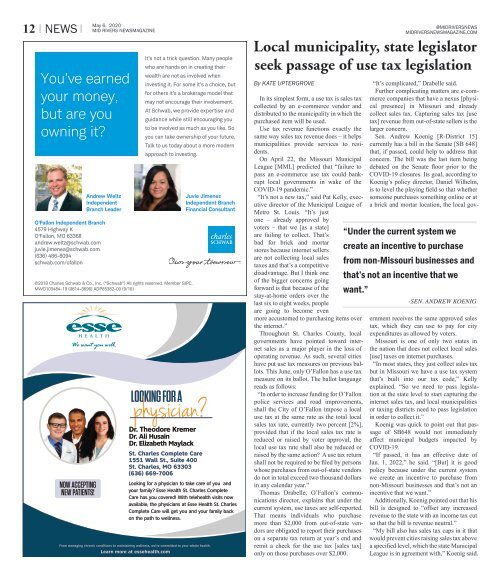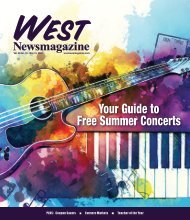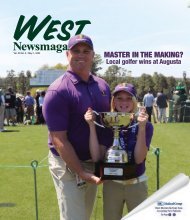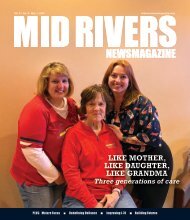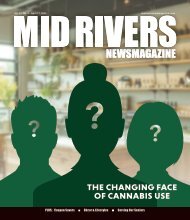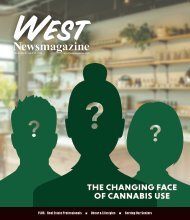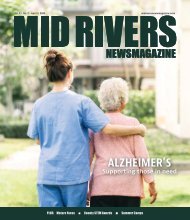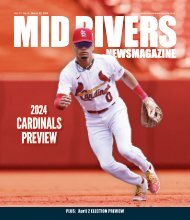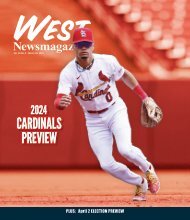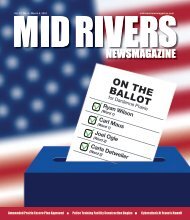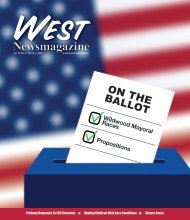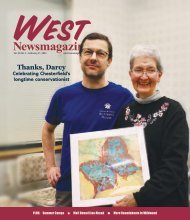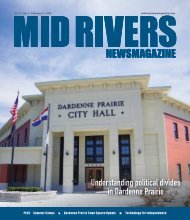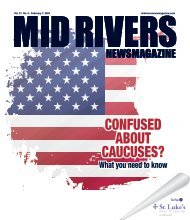Mid Rivers Newsmagazine 5-6-20
Local news, local politics and community events for St. Charles County Missouri.
Local news, local politics and community events for St. Charles County Missouri.
You also want an ePaper? Increase the reach of your titles
YUMPU automatically turns print PDFs into web optimized ePapers that Google loves.
12 I NEWS I<br />
May 6, <strong>20</strong><strong>20</strong><br />
MID RIVERS NEWSMAGAZINE<br />
You’ve earned<br />
your money,<br />
but are you<br />
owning it?<br />
Andrew Weltz<br />
Independent<br />
Branch Leader<br />
O’Fallon Independent Branch<br />
4579 Highway K<br />
O’Fallon, MO 63368<br />
andrew.weltz@schwab.com<br />
juvie.jimenez@schwab.com<br />
(636) 486-8094<br />
schwab.com/ofallon<br />
It’s not a trick question. Many people<br />
who are hands on in creating their<br />
wealth are not as involved when<br />
investing it. For some it’s a choice, but<br />
for others it’s a brokerage model that<br />
may not encourage their involvement.<br />
At Schwab, we provide expertise and<br />
guidance while still encouraging you<br />
to be involved as much as you like. So<br />
you can take ownership of your future.<br />
Talk to us today about a more modern<br />
approach to investing.<br />
©<strong>20</strong>18 Charles Schwab & Co., Inc. (“Schwab”) All rights reserved. Member SIPC.<br />
MWD103484-19 (0614-3696) ADP85382-00 (9/18)<br />
Juvie Jimenez<br />
Independent Branch<br />
Financial Consultant<br />
By KATE UPTERGROVE<br />
In its simplest form, a use tax is sales tax<br />
collected by an e-commerce vendor and<br />
distributed to the municipality in which the<br />
purchased item will be used.<br />
Use tax revenue functions exactly the<br />
same way sales tax revenue does – it helps<br />
municipalities provide services to residents.<br />
On April 22, the Missouri Municipal<br />
League [MML] predicted that “failure to<br />
pass an e-commerce use tax could bankrupt<br />
local governments in wake of the<br />
COVID-19 pandemic.”<br />
“It’s not a new tax,” said Pat Kelly, executive<br />
director of the Municipal League of<br />
Metro St. Louis. “It’s just<br />
one – already approved by<br />
voters – that we [as a state]<br />
are failing to collect. That’s<br />
bad for brick and mortar<br />
stores because internet sellers<br />
are not collecting local sales<br />
taxes and that’s a competitive<br />
disadvantage. But I think one<br />
of the bigger concerns going<br />
forward is that because of the<br />
stay-at-home orders over the<br />
last six to eight weeks, people<br />
are going to become even<br />
more accustomed to purchasing items over<br />
the internet.”<br />
Throughout St. Charles County, local<br />
governments have pointed toward internet<br />
sales as a major player in the loss of<br />
operating revenue. As such, several cities<br />
have put use tax measures on previous ballots.<br />
This June, only O’Fallon has a use tax<br />
measure on its ballot. The ballot language<br />
reads as follows:<br />
“In order to increase funding for O’Fallon<br />
police services and road improvements,<br />
shall the City of O’Fallon impose a local<br />
use tax at the same rate as the total local<br />
sales tax rate, currently two percent [2%],<br />
provided that if the local sales tax rate is<br />
reduced or raised by voter approval, the<br />
local use tax rate shall also be reduced or<br />
raised by the same action? A use tax return<br />
shall not be required to be filed by persons<br />
whose purchases from out-of-state vendors<br />
do not in total exceed two thousand dollars<br />
in any calendar year.”<br />
Thomas Drabelle, O’Fallon’s communications<br />
director, explains that under the<br />
current system, use taxes are self-reported.<br />
That means individuals who purchase<br />
more than $2,000 from out-of-state vendors<br />
are obligated to report their purchases<br />
on a separate tax return at year’s end and<br />
remit a check for the use tax [sales tax]<br />
only on those purchases over $2,000.<br />
@MIDRIVERSNEWS<br />
MIDRIVERSNEWSMAGAZINE.COM<br />
Local municipality, state legislator<br />
seek passage of use tax legislation<br />
“Under the current system we<br />
create an incentive to purchase<br />
from non-Missouri businesses and<br />
that’s not an incentive that we<br />
want.”<br />
-SEN. ANDREW KOENIG<br />
“It’s complicated,” Drabelle said.<br />
Further complicating matters are e-commerce<br />
companies that have a nexus [physical<br />
presence] in Missouri and already<br />
collect sales tax. Capturing sales tax [use<br />
tax] revenue from out-of-state sellers is the<br />
larger concern.<br />
Sen. Andrew Koenig [R-District 15]<br />
currently has a bill in the Senate [SB 648]<br />
that, if passed, could help to address that<br />
concern. The bill was the last item being<br />
debated on the Senate floor prior to the<br />
COVID-19 closures. Its goal, according to<br />
Koenig’s policy director, Daniel Wilhelm,<br />
is to level the playing field so that whether<br />
someone purchases something online or at<br />
a brick and mortar location, the local government<br />
receives the same approved sales<br />
tax, which they can use to pay for city<br />
expenditures as allowed by voters.<br />
Missouri is one of only two states in<br />
the nation that does not collect local sales<br />
[use] taxes on internet purchases.<br />
“In most states, they just collect sales tax<br />
but in Missouri we have a use tax system<br />
that’s built into our tax code,” Kelly<br />
explained. “So we need to pass legislation<br />
at the state level to start capturing the<br />
internet sales tax, and local municipalities<br />
or taxing districts need to pass legislation<br />
in order to collect it.”<br />
Koenig was quick to point out that passage<br />
of SB648 would not immediately<br />
affect municipal budgets impacted by<br />
COVID-19.<br />
“If passed, it has an effective date of<br />
Jan. 1, <strong>20</strong>22,” he said. “[But] it is good<br />
policy because under the current system<br />
we create an incentive to purchase from<br />
non-Missouri businesses and that’s not an<br />
incentive that we want.”<br />
Additionally, Koenig pointed out that his<br />
bill is designed to “offset any increased<br />
revenue to the state with an income tax cut<br />
so that the bill is revenue neutral.”<br />
“My bill also has sales tax caps in it that<br />
would prevent cities raising sales tax above<br />
a specified level, which the state Municipal<br />
League is in agreement with,” Koenig said.


